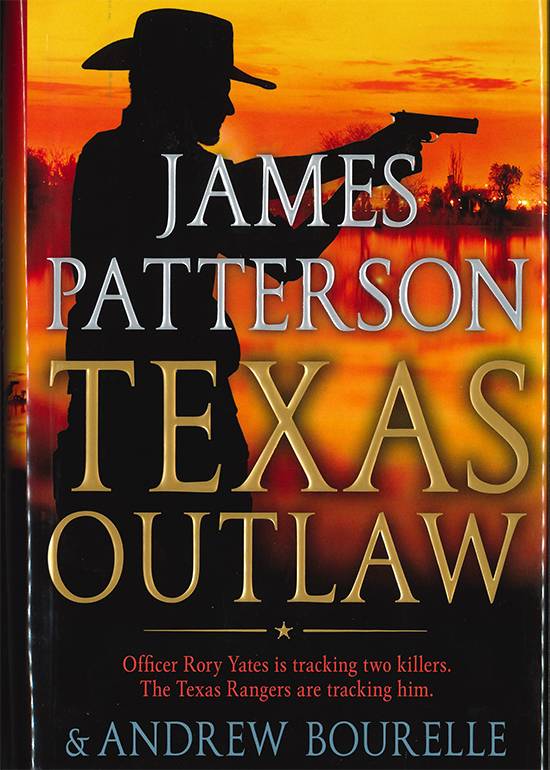Second Verse Better Than The First

Texas Outlaw
by James Patterson and Andrew Bourelle
New York: Little, Brown and Company, 2020.
435 pp. $28.00 hardcover.
Reviewed by
William Jensen
James Patterson holds a strange spot in contemporary fiction. Working with a team of co-authors and ghost writers, he has transcended the realm of “best sellers” to become something else entirely. Some have labeled him as a brand, a type of literary factory, an assembly line of mysteries and thrillers. This year alone has seen at least eleven new Patterson products. He consistently publishes novels, children’s books, YA narratives, and he lends his name to several series. Stephen King once referred to himself as the literary equivalent of a big mac and fries, so James Patterson might be considered the Diet Coke of novelists. But James Patterson and his crew of scribblers continue to satisfy his fans with entertainments that are perfect for the beach, the train, and lazy days in a hammock. James Patterson is the ultimate airport author.
With Texas Outlaw, Patterson re-teams with Andrew Bourelle for the follow-up to 2018’s Texas Ranger. I reviewed that first novel and enjoyed it, but there were flaws that frustrated me. Some narrative choices came across as rushed or half-baked, and the characters felt underdeveloped. I am happy to say that Texas Outlaw is a superior novel. Patterson and Bourelle have a better grasp of the world and the crimes that inhabit this new series. The narrative is better structured; it is elaborate without being confusing. In this latest adventure, Yates is sent to investigate a murder in a small town in West Texas where nothing is quite as it seems, and things quickly escalate. A councilwoman has died under mysterious circumstances, and a father-son team of local oil barons may be responsible. Yates works with local detective Ariana Delgado who becomes his friend, his (possible) love interest, and his guide to this secretive desert town. Delgado is a tough cop and hopefully will receive her own series someday. She is easily the best part of this mystery. It is she who leads Yates through the lies, cover-ups, secrets, and the various twists and reversals.
The momentum throughout is fast in typical Patterson fashion, and the dangers soon multiply into impossible odds by the novel’s climax. There are some great shootouts. Yet, as fast and fun as the book is, there is a flatness that rapid chapters, gunfights, and chases cannot solve. I think my biggest complaint is that our hero is generic and too goody-goody. He says the right things. He does the right thing. He’s nice. He’s handsome. He’s good at his job. And, like I said in my previous review, he doesn’t have any warts. Sometimes a flat protagonist works. Stu Redman in The Stand is an everyman so readers can imprint their identities onto him while the fantastical occurs around him. Frederick Henry in A Farwell to Arms is so numb from war that he is difficult to see or know, which lets Hemingway’s sentences take center stage. But those books have supplements to their plots that divert the reader’s attention. Texas Outlaw stays heavily focused Rory Yates, and he is not interesting enough to stay 100% invested in. Robert B. Parker’s Jesse Stone has his drinking problems, Walter Mosley’s Easy Rawlins battles racism in post-war Los Angeles; even Hercule Poirot has his mustache. Yates? He likes country music, Texas, and doing the right thing. Rory Yates might be a good Texas Ranger but he’s not an interesting one. About halfway through the novel, Yates meditates on his choices and thinks, “I’m a Ranger. Texas is where I belong. As long as I can draw breath into my lungs, I want that air to be Texas air.” Elements like this make Yates so squeaky clean that the rest of the novel suffers. He is the good guy; the bad guys are bad (and they’re really bad), and you know everything will end up all right. Obviously, readers anticipate the survival of their mystery’s detective, but the fictional heroes that endure typically have more going on than just the conflict at hand.
Though there is a simplicity to the character and the plot, I suspect fans of Patterson will enjoy this latest yarn. It moves quickly and economically. It should be noted (I suspect mostly to Bourelle) that the sentences are clean and dry as West Texas itself. There is never a confusing line or a risible simile. The violence is swift without being gratuitous; Patterson and Bourelle keep things at a PG-13 level. And I admit the novel achieves what it wants to do. But like Texas Ranger, I simply wish the book took more chances. I like to imagine in the next Rory Yates mystery that Patterson and Bourelle decide to shake things up. What if Yates messed up a big case and became disgraced? What if some bad guys got their hands on him and tortured him so he went insane? What if he discovered joy in rap music or became a Francophile? What if something outside the ordinary happened?
The funny thing is that I bet this will happen in the next installment. Bourelle’s solo work is tough, honest, and thrilling. I suspect here he is holding back. Perhaps the next Rory Yates outing will be the one that breaks loose and goes from a trot to a gallop.
William Jensen is the editor of Texas Books in Review and Southwestern American Literature. He is the author of the novel Cities of Men, and his short fiction has appeared in North Dakota Quarterly, Tinge Magazine, The Texas Review, and elsewhere. You can follow him on twitter @wjwriter.
